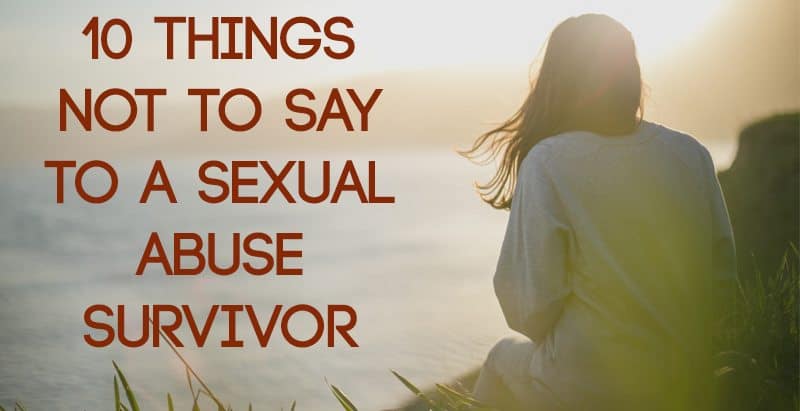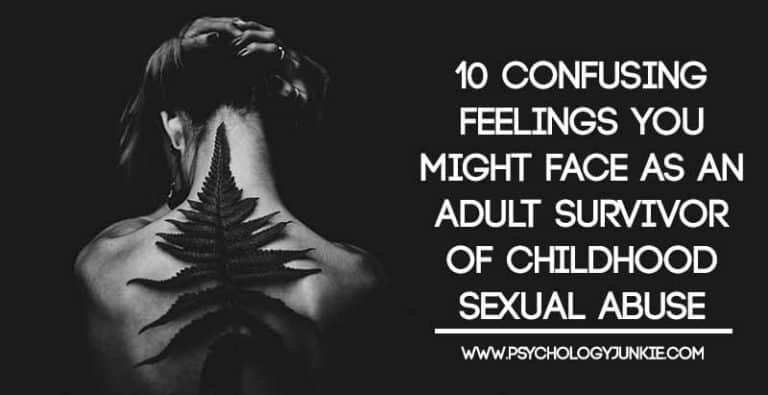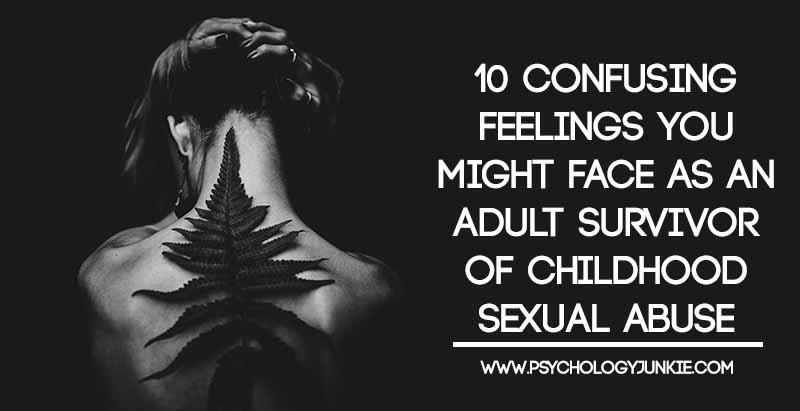10 Things Not to Say to a Sexual Abuse Survivor
There’s no faster or easier way to add tension to a conversation than to bring up the topic of rape. It’s awkward, it’s taboo, it’s something that people want to ignore. It scares us, makes us uncomfortable, and might even remind us of some of our own personal demons we’d like to pretend don’t exist. I don’t even like to say the word rape; it’s almost like there’s an invisible brake on my tongue when I try. It’s easier for me to push the memories and the pain into the background and pretend it never happened. It’s easier not to think about the 293,000 victims of sexual assault that add up every year in the US alone.
Statistics say 1 in 4 girls and 1 in 6 boys will be sexually abused by the time they’re 18-years-old, and 1 in 3 American women will be sexually abused during their lifetime. Just look around. That’s at least several people you know. Maybe they’ve come to you, maybe they haven’t. What do you do when one day your friend, your sister, or maybe your own child tells you that they’ve been sexually abused? What do you say? How are you supposed to react? You probably feel angry, scared, maybe disbelieving. There are a plethora of emotions people feel when they’re confronted with the news that someone they love has been assaulted. I’m writing this blog in the hope that it will help more people know how to respond if they’re faced with this situation.

As I’ve worked on writing this post I’ve realized that I need to break it into parts because there is just too much to say. For this post, I’m going to focus on what not to say to a victim of sexual abuse.
Why I Care About This
I’ve been sexually assaulted and abused at various times in my life. I don’t want to go into all the details right now, but I remember when it happened there were some things people said that really helped. There were also some things people said that really hurt. I don’t want to make this post about me, but I do want to be able to use my experience to help others if it’s possible. Nobody walks away from a sexual assault unscathed. There are instances that I’ve talked about with my family, and there are other occurrences that I’ve never spoken about to anyone. People say we need to “break the silence” to stop this from happening to other people. While I agree that talking about it can help others, I think that we shouldn’t push people to talk about it before they’re ready. For a lot of us, myself included, talking about it makes us feel overwhelmed with shame. It takes a while to fully come to terms with what happened, and it takes a while for some of us to realize that it wasn’t our fault.
Knowing the right way to respond when someone comes to you can make a huge difference in their life. What they’ve been through will change and shape who they are, and how you respond can either tremendously help or hurt them. Be very careful and conscientious about how you respond.
Three Basic Rules
- Believe Them – Only 2-5% of rape allegations are false. It takes a lot of courage to tell someone about a sexual assault or sexual abuse. Don’t dishonor the victim by questioning them or being distrustful.
- Support Them – If they’ve come to you immediately after the event, ask them if they need a ride to the hospital, to the police, anywhere. Ask what you can do to help. Keep being their friend, and check in to make sure they’re doing okay. Keep in mind, the survivor may need some space.
- Don’t Criticize the Survivor’s Actions Leading Up to the Assault – The victim may have made poor choices beforehand. They may have gone somewhere that wasn’t safe, had too much to drink, or spent time with the wrong friends. Either way, when they come to you after an assault it’s not the time to judge them. It’s time to help them. Later on after they’ve had time to heal maybe you can gently and carefully offer some advice if you feel it’s needed; but be careful to not in any way imply that their actions made the assault their fault.
10 Things Not to Say to Someone Who’s Been Raped or Sexually Abused
- “It Takes Two to Tango”
I had two different people say this to me after they learned of one of the rapes I went through. In this case, it was date rape. I went out to dinner with the man, and as soon as the date began I knew I didn’t like him. I split the check 50/50 so that he wouldn’t feel entitled to anything. It still happened. Certain people think that if you go on a date with someone and you’re assaulted, that you’ve halfway asked for it. Nope. The only way you ask for it is if you literally ask for it. By saying that the survivor had some part to play in their own assault is enforcing self blame that will likely plague them for the rest of their life.
- “You Should Have Reported It!”
68% of rapes go unreported, and even when a rape is reported, only 3 out of 100 rapists will ever serve a day in prison. Immediately after a sexual assault, the first thing many of us can think to do is get to safety. You’re in survival mode. You just want to get away, to find safety, to get clean. You aren’t thinking clearly, and the first thing most rape victims want to do is take a shower; to wash off everything that just happened. Unfortunately, this washes away a lot of the DNA evidence that’s needed for a conviction. Even if you do go to the police right away, rape is notoriously hard to convict someone of in court. Having to testify about your experience is demoralizing, and then if the justice system fails you in convicting your rapist, then it’s almost as bad as experiencing the whole thing all over again. You also leave that courtroom worrying about retribution from the attacker, his friends, and his family.Another point I want to make is that sometimes the abuser is a family member, a friend, or someone of influence. Sending a family member that everyone loves to prison is an incredibly hard choice to make.The most important thing to do is support survivors in their decision whether or not to report their assault. Only they can make that call.
- “What were you wearing?”
Surprisingly this question gets asked a lot. This is another way for people to determine if they can blame the victim for part of what happened to them. What you wear doesn’t make it your fault. The rapist might try to make it your fault; that’s what they do. It doesn’t matter what anyone was wearing or not wearing. Modesty or lack thereof does not make someone less worthwhile, and does not give permission to anyone to be raped.
- “Why didn’t you fight back harder?”
Most of the time when someone is being assaulted they go into a state of shock. They can’t believe what is happening. If they were sexually abused as a child they may disassociate with what is happening and feel as if it is an out-of-body experience that they can’t control. I remember saying “no” over and over again, but fighting to get the words out of my mouth because I felt like I wasn’t even a part of my own body. I felt like I was a light bulb hanging from the ceiling, just watching the whole thing but being unable to do anything to stop it. I felt paralyzed. This happens to countless victims. There could be a hundred reasons someone didn’t fight back hard enough to make it stop. Most survivors ask themselves why they didn’t fight harder afterwards, and usually it’s because of shock and disassociation. Don’t go there with your questions.
- “I thought only girls were raped”
1 in 6 boys are sexually abused before the age of 18, and this is probably underestimating. Men are much less likely to disclose sexual abuse than are females, plus only 16% of men with documented histories of sexual abuse (by social service agencies, which means it was very serious) considered themselves to have been sexually abused, compared to 64% of women with documented histories in the same study.Men and women both feel a deep sense of isolation after a sexual assault; however, since female sexual assault is more common, there seems to be more of a stigma surrounding male sexual abuse victims. This often leads men and boys to keep it a secret; and the outcome often results in PTSD, depression, feeling like “less of a man” and concerns about sexual orientation. If a male confides in you about a sexual assault, take them very seriously. It took a lot of courage and bravery for them to tell you.
- “It’s all part of God’s plan.” or “It must’ve been God’s will”
Don’t blame God for what a rapist has done to someone. I believe that God is grieved by rape and sexual abuse and that he doesn’t orchestrate it. Saying this to someone who has been sexually assaulted will almost always make them ask themselves “what kind of God am I serving if this is part of his plan?“. If you do believe this, just keep it to yourself for the time being. When someone comes to you about sexual assault it’s not time for a lesson in your theological beliefs. I say this without trying to sound bitter or angry. I’ve had some wonderful people tell me this, and I love them. I know their intentions and motives are good, it just isn’t a helpful thing to say. Along with dealing with the assault, you don’t want to cause a victim to question their faith. Their faith may be a huge support to them in recovery. Remind the victim of God’s love, yes; tell them you’re praying for them. Just don’t make what happened sound like something that God put into play.
- Don’t ask if we’re “over it” or tell us to “get over it”
In the wake of the assault and throughout the recovery process, a survivor may change a lot. They may never be able to go back to the way things were. This kind of trauma doesn’t heal like a broken bone, and mental issues like PTSD, depression, and anxiety can all become a part of the survivor’s life afterwards. Try to do some research on the effects of sexual abuse to see how you can be supportive; but don’t try to push the survivor into being exactly how they were before. That may never happen.
- Don’t compare rape stories
For example, don’t say something like “Well at least you weren’t like that girl I read about in the news who was locked in a basement…”, or “well at least you weren’t raped by someone you really trusted”. Making statements like this is dehumanizing to the survivor, and belittles their pain. Plus hearing about another incident of assault may trigger fear and anxiety. Be very careful not to speak lightly of rape to someone who has been through it before.
- Don’t tell anyone else
If someone has entrusted you with their story, do not share it with anyone else unless they have specifically asked you to. This is not your story to tell, it’s theirs. Telling anyone else would be a huge betrayal of trust.
- Don’t ask for details
We live in a very voyeuristic world, with stories making headlines that have numerous gratuitous details. Many rape victims don’t want to re-live or re-state all the details of what happened. Some may want to talk about it to find healing or support; that’s fine. Just don’t ask them for details, let them be the ones to share them.
I hope that this has been helpful in some way. I am so thankful to the people in my own life who said the right things, and even some who didn’t. If your intentions are good, and you’re supportive, even if you slip up a little bit and say the wrong thing, your actions mean the most.
I am going to write again soon (I hope) with things TO say to survivors of sexual assault.







I was the victim of sexual abuse. A clinical psychologist conducting an evaluation commented, “children experiment” in reference to part of my story. The next time I saw her, I mentioned her comment was inappropriate. She ignored further comments by telling me to talk to my therapist. what prompted me to challenger her was the fact other therapist consider this particular comment inappropriate. This sort of approach leaves out a major point, children do not ‘know’ what they are doing, even though they appear to.
this is third party inference, which leaves out the abused child.
Hi Susan, I found this extremely helpful because of what happened to a good friend of mine. Did you write in the meantime what TO say? I would be interested to read! Thanks, Uwe
[email protected]
One more thing to add
When a survivor is trying to come out and tells you their story and the name of the abuser….don’t ask them “why now?” especially if they took years to build up the courage to tell anyone. Or “what good is it going to do if you go public?”
That just throws tham back to sq 1….the silence
I would disagree on part of this article, something like this is defnitley a situation to take emotional caution with, but to be okay with the victim not giving up the abuser’s name I don’t beleive is the right thing to do unless maybe it has been like 20+ years or something. The rapist needs to be punished or they will continue to harass parts of society and weaken the better side of the people, and they will also become more powerful. I wouldn’t try to force an answer out of them, give them time, but at some point there should be effort made to find the rapist if the victim does not want to reveal the name. If we hammer on this enough I believe we could make this a minimal thing rather than having such a large statistic of 1/3 women raped in a lifetime.
I agree with John Doe, and do not agree that it is betrayal to tell if you know of rapes or a rape! For future safety and the safety of others especially when there seems to be a trail of rape around particular people!
Never say, “just get over it.”
50 years after being molested by grandfather
a hundred times.
30 Years of marriage.
wife says, Get over it”
I can relate. So many times people in my family have told me to get over it. I also was molested over a hundred times and if I could get over it I certainly would. It changed who I am. It changed my brain and how I am wired. There is no getting over it, it’s part of my story and a terrible building block to my life. Im always trying to recover but my brain remembers and acts out in its own ways for the rest of my life. The shame is unbearable at time but has gotten better through the decades. It’s still there though.